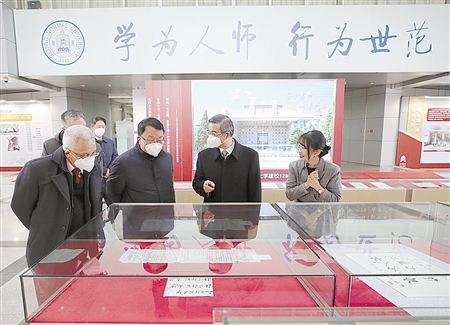Zhou Qiang urges more research into duty crimes

Supreme People's Court President Zhou Qiang (C) visits Beijing Normal University on Feb 2, 2023. [Photo/court.gov.cn]
High-end think tanks should be launched to deepen research into duty crime, said Zhou Qiang, president of the Supreme People's Court (SPC), when he attended the unveiling ceremony of a duty crime research base in Beijing Normal University (BNU) on Feb 2.
The research base, jointly initiated by the No 2 Criminal Division of the SPC and the Law School of the BNU, grew out of a research center for the regulation of duty crimes and anti-corruption fugitive repatriation and asset recovery.
It will be built into a high-end think tank targeting duty crime research and will provide theoretical support to the trial of related cases.
Zhou said that the establishment of the base is an "important move" to combine legal theory and judicial practice, which is a good attempt to deepen the research on duty crimes and better serve the country's anti-corruption campaign.
The newly launched research base should give full play to its role as a high-end think tank, build itself into a major platform for theoretical research, teaching and academic research, talent training, and international exchanges, Zhou noted.
He also urged for influential research results to provide strong theoretical support for duty crime trials, and called for more efforts to study and solve major problems existing in trial practices, and to advance theoretical innovation and the training of legal talents in the field of duty crime.
The research on the mechanism for pursuing fugitives and recovering assets in anti-corruption cases and the theories thereof should be strengthened, and the exchanges and cooperation with legal theorists and practitioners worldwide should be deepened, he added.
Cheng Jianping, Party chief of the BNU, said that the university will further contribute its wisdom to China's and the worlds anti-corruption governance through the research base.







